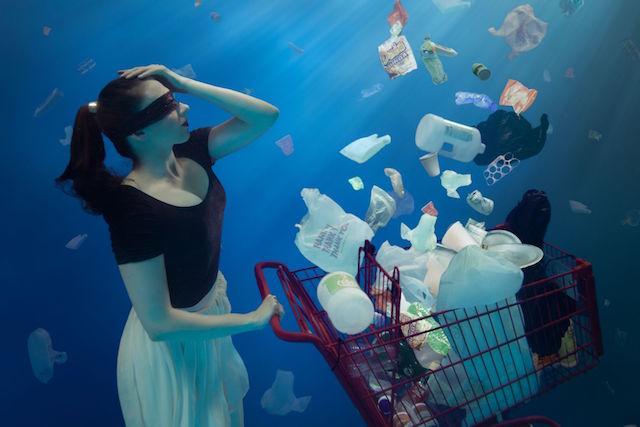(Photo by Brett Stanley Photography)
“Do we need anything from the shops?” I ring home from Waitrose, half way through my shopping. “Maybe some tomatoes and salad leaves. Remember it’s plastic-free Friday.”
Today is the first Friday since we joined the campaign run by Friends of the Earth, highlighting the impact of plastic on the environment. Every minute a truckload of plastic enters our oceans – try to imagine that. Trucks lined up as far as you can see and every 60 seconds, day and night, plastic slowly tips over the pier: bottles; shopping bags; clingfilm; clear avocado or pear-shaped packaging; satsuma-coloured netting and some of it is already in my trolley. I put it back on the shelf and look around for paper bags. I pick up a few that are meant for mushrooms and fill them with loose parsnips, red peppers, onions and apples. I grab a bundle of beetroot as well – I think we’ll have roasted vegetables tonight. It would be nice to have some vegetarian sausages to go with them but I can’t see a plastic-free way towards that end. Nor will we have a green leafy salad – emptying them out of their plastic container into a paper bag crosses my mind for a second but I don’t think it would count, and there might be problems at the check-out.
There is a box of loose, medium-sized round tomatoes, cheaper than the packaged varieties; I pick one up to inhale its aroma and find… nothing. I remember the disappointing nothing taste of a nice-looking tomato and give them a miss. A bottle of wine and chocolate fit the bill though and smiling contentedly I place my goods onto the conveyer belt. The healthy looking young check-out assistant and I have an engaged conversation about tomatoes and packaging. She was brought up on a farm and she explains how a lot of water makes tomatoes grow quickly without acquiring any taste or nutritional value. She encourages me to write to Waitrose about packaging. I may get around to it after writing this blog.
Getting involved in small actions like this feels good – it’s connecting. Last Saturday I co-facilitated a day on the “work that reconnects,” devised by the Buddhist systems theorist and activist Joanna Macy. It offers creative ways to face up to the many difficult environmental, social and political issues that can eat away at our conscience and I am not lying when I say that is was fun. We experienced the transformational power of working through 4 stages: gratitude, honouring the pain for the world, seeing with new eyes and going forth. At the heart of the work is a felt sense of our interconnectedness – knowing ourselves to be part of a resilient, emerging system rather than a separate, fragile unit. It means opening with compassion to the pain in the world as well as being buoyed up by the strength and support of community. It lets me enjoy this little plastic-free Friday project, aware of the inevitable ripple effects.


My pepper dreams this year are so big that I could write up an entire blog post like this one! This will be the first year in a long time that I don”t have a bell pepper in the lineup. It”s not that I don”t like them and I found one that does very well here, but I finally admitted to myself that I prefer other types of sweet peppers. This week I sowed seeds for 13 different sweet peppers. And I”m a baccatum addict too, there”s 10 in the lineup this year. But wait, there”s even more! Five more non-sweet annuums and 4 chinense. I don”t know where I”ll put all of them. I always find aphids on my pepper seedlings and last year I thought that thrips might be joining the party too so I gave the seedlings a dose of Spinosad and had the best bunch of seedlings in years. I think I”ll be trying the treatment again this year as a prophylactic treatment. I also experimented with treating my tomatoes and peppers with an early spray of Serenade because of the devastating powdery mildew infection that took my peppers down in 2016. I had no PM in the peppers and almost no problems with fungal diseases in the tomatoes which was a first. I”ll be doing the prophylactic spray with Serenade again too. I think that if I wait until I see problems that it”s already too late to effectively treat them. So knowing that there”s always diseases in my tomatoes every year and bugs on the peppers every spring I”ll just treat the problems before I see them.